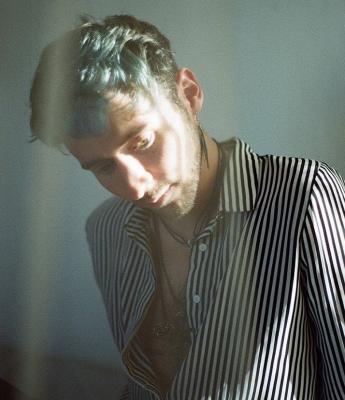

Kaspar Ravel in residence at Sorbonne University
Following the call for applications launched in early 2022, Sorbonne University will host the artist Kaspar Ravel starting in October, for a residence in the field of digital arts. This residency aims to give its full place to the potential of artistic creation offered by a plural environment of knowledge production. It is about valuing creation as the fruit of encounters between sciences and arts and of dialogue between the university and the city.

Presentation of the artist
Kaspar Ravel develops his digital art by hijacking technology to create narrative forms from the flaws of digital systems (bugs, noises, distortions) that he interprets and transcribes in the form of art installations and audiovisual performances.
Passionate about science and technology, Kaspar Ravel defines himself as a multidisciplinary "artist-hacker" belonging to the glitch art movement, whose creations hybridize poetry and algorithms, sensory immersion and social criticism. His creations occupy a wide spectrum of artistic expressions, from object design (physical, digital) to literature, from installation creation to live audiovisual on stage, with a resolutely current and political approach.
The project entitled Affective Artefacts that Kaspar Ravel will deploy at Sorbonne University will be built around the relationships between science, technological tools and narrative and methodological materials used by research in different literary and scientific disciplines. Through collective, thematic and creative workshops, the artist will enable the public to discover the emotional dimension of the artifacts produced by technology and will transform them into a creation.
For the implementation of Kaspar Ravel's project, Sorbonne University provides an environment conducive to the smooth running of the residency. The artist will be fully integrated into the university community and will work in close interaction with the scientific teams with which he will be led to work.
The artist's work will be shared within the Sorbonne University Alliance and its European university network, 4EU+, as well as its international partners.
Presentation of the residency
A new project for the university
For the first time Sorbonne University launches a collective project of artist residency. The university—which is characterized by its plurality (disciplinary, geographical, temporal, heritage and missions)—is also a vector of transformation of ideas, concepts and knowledge into inspirations for creation and resources for its realization.
The aim of the residency is to increase the connections between research and creation, to experiment with new practices in the service of research and training, and to renew mediation practices. The aim of the residency is to promote creative encounters between the sciences and the arts and a dialogue between the university and the city.
The call for applications launched in February 2022 led to the submission of 33 eligible projects that were submitted to the jury. Kaspar Ravel was selected from four applicants reviewed by the jury in early July.
The jury members:
- Gilles Alvarez, artistic director of the Biennale Némo/Le 104-Paris
- Pierre-Marie Chauvin, associate professor in sociology, Vice-president of Arts, Sciences, Culture and Society at Sorbonne University
- Gilles Demonet, professor of musicology, head of the Master's degree in Music Administration and Management, director of IReMus
- Larisa Dryansky, associate professor in contemporary art history at Sorbonne University
- Alexandre Guilbaud, associate professor in mathematics and history of mathematics, vice-dean of Interdisciplinarity in the Faculty of Science and Engineering at Sorbonne University
- Frédérique Pain, director of the ENSCI-Les ateliers
The digital arts
The field of digital arts was chosen for this residency with the aim of promoting them at the heart of a multidisciplinary academic and artistic approach. The digital arts integrate the evolution of traditional artistic practices with the emergence of new fields resulting from combinations linked to the evolution of technologies.
The worlds of science and digital arts share the principle of free, open and public culture. The communities involved share a set of values, including free art, open science, open source architecture, collaborative design, and a free and open Internet.
